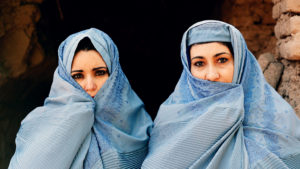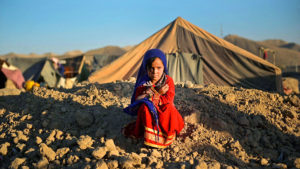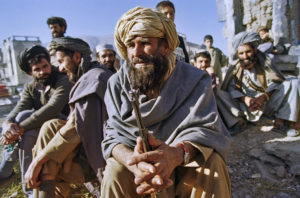One would think Afghanistan’s Taliban government has plenty to keep it busy: the banking system is collapsing; it is the target of crippling sanctions; the economy has ground to a halt; Isis conducts regular terror attacks; and not a single country has recognised their government. Yet instead of formulating a sensible plan to tackle these challenges, the Taliban are choosing to occupy their time with the issuance of increasingly preposterous edicts regarding girls and women. This is exasperating and disappointing. But it is also intriguing, because there are growing indications that this issue is starting to split the ranks of the Taliban.
Even within the iconoclastic organisation, there are some for whom this forced backward march does not make sense. It’s one thing to be highly pious and ultra-conservative. It’s quite another to blast out eccentric, made-up rules with no foundation in mainstream Islamic doctrine or Afghan history and custom. Today, it’s all too easy to imagine a bunch of bearded old men sitting around in Kandahar dreaming up the next ridiculous way to annoy girls and women: girls above the age of 12 turned away on the first day of school; female university students ordered by guards not to wear scarves that are too cheerful in colour; female news anchors told they must cover their entire faces except for the eyes. So much for the hopes that this time around, the Taliban would be different.
The conclusion from all this seems obvious: after seeming to have learned from the failure of their previous time in power, the Taliban are now back to oppression as usual. Yet a more granular look reveals a peculiar vacillation in the Taliban’s edicts on women.
Under the current regime, an order is announced — then, right away, it is partially taken back or softened. Attempts are made to enforce it, but these are also erratic and uneven. Flurries of contradictory explanations and announcements follow. We’re told that girls in Grade 6 and above will not return to school. Wrong — they will, just not yet. We’re told this is because additional female teachers need to be recruited. Wrong again — it’s because a more concealing Islamic school uniform needs to be designed and manufactured. As for adult women, we’re told they must wear a hijab, but then that a headscarf is sufficient. Actually, no it isn’t: they must wear the burqa and be covered up completely. Well, no, it doesn’t have to be an actual burqa, a hijab is fine after all. But wait, they must also cover their necks and faces except for the eyes. But that’s just a recommendation, not a requirement. But it will be enforced.
What is going on here? Are the Taliban collectively maniacal, changing their minds as their mood shifts? It’s unlikely — you don’t fight and win a 20-year insurgency by being indecisive. Rather, these sequences of contradictory statements reflect their internal divisions on how to govern, and where they want the country to go. A tug of war is taking place and the cracks are starting to show.
Already there have been a number of eruptions. In a recent speech, Sher Mohammad Abbas Stanikzai, a high-ranking Talib, went so far as to accuse those calling for the exclusion of girls from middle and high-school education of disrespecting shariah. Because how could girls and women claim their Prophet-given rights if they can’t get enough education to learn what those are? More astonishing still are the credible reports of shouting matches between the Supreme Leader in Kandahar, Haibatullah Akhunzada, and his own bodyguards, in which the latter accused him of wasting the sacrifices made by their comrades and turning the country into an impoverished backwater shunned by all.
These rumblings in the ranks are partly down to the fact that today’s Taliban is more like a multi-party system. In one corner we have the Doha Group, which consists of those Taliban who were involved in the peace negotiations. For years they lived in Qatar, which, while unimpeachably Islamic, is not neurotic on the subject of women. Education is universal and excellent. There are high-profile women in corporate and political life. Both men and women wear traditional dress that includes a head covering, but women are not expected to conceal their faces or to stay at home. Public life is very family-oriented, with malls and parks populated by happy, relaxed parents and their children enjoying their leisure time together. All of this was not lost on the Afghans. Indeed, many of them left their families there when they returned to Afghanistan to join the government.
Then there is the Haqqani Group, which was based in Pakistan. While the country is conservative, it is also home to strong, publicly engaged women: politicians including heads of state, entrepreneurs, cultural icons, scientists. Their Taliban guests took note. There are also regional Taliban power centres which, due to the decentralised nature of an effective insurgency, are accustomed to exercising considerable autonomy. The Taliban is not a hierarchical organisation, nor does Akhunzada have the theological position or weight of, say, Ayatollah Khomeini. So to have him issue consequential pronouncements on his own, without consultation, rankles.
There may also be ideological and theological reasons why some of the factions are distinctly more forward-leaning about women’s rights. A significant part of this more progressive interpretation of Islam seems to be rooted in their vision for the country, and its most likely path from abject poverty to modest prosperity. That path has as its absolute requirement the acceptance of the international community. Nothing good will happen unless the government is recognised, sanctions are eased, frozen assets are returned, and investment occurs.
There is a bit of healthy defiance in this vision. The insurgency was driven by the narrative that the country was bent under the yoke of foreign occupation and the corrupt elite it had introduced. But whatever its contradictions, the impulse is present and may prove impossible for the Kandahar Grandfathers to suppress.
In August and September of last year, as the Taliban took control of Kabul, videos and photos surfaced on social media showing young Taliban soldiers encountering modernity. These were amusing vignettes, the classic stereotype of hillbillies in the big city for the first time. One group had entered the abandoned Presidential Palace, gone exploring, and found the gym. Tentatively at first, they investigated the bizarre contraptions, testing to see if they were weapons, then quickly discovering their functions and filming each other laughing as they tried them out. Others went to the zoo and stared in dumbstruck fascination as they came face-to-face, for the first time, with the residents of an aquarium. Kalashnikovs slung across their torsos, one group traversed the lake in Bandiamir on swan-shaped pedal boats. The videos were faintly comical, but they were also enlightening. These were young people out in the world for the first time, and they were curious, open to new things, open to joy. These young Talibs don’t want to live in Jurassic Park. They want to be part of the larger world. And that world includes women.
This isn’t the only change worthy of note. The last time around, repressive edicts by the leadership were met with disdain by the outside world and sad despair by the Afghan public. What we see this time is quite different. Now, men are part of the protest against the backward slide of women’s rights. In reaction to the forced veiling of female news anchors, for instance, male colleagues made a high visibility statement by also reading the news with their faces covered.
Is there anything we can do to support these dissenters? Well, if the past 20 years have taught us anything, it’s that our efforts at overt social engineering are not likely to meet with much success. These kinds of changes, of foundational social norms and gender relations, must happen from within. And what are the prospects of that? On the downside, this is a deeply patriarchal society, in which everyone submits to the dominion of the alpha male. Such habits are hard, but are certainly not impossible to break.
On the other hand, we mustn’t forget that, demographically, this is an extremely young society, where the power de facto rests with the young soldiers, the young farmers and the small group of remaining young educated doctors, managers and technocrats. Also, there is no credible opposition. No one really believes that any of the has-beens can muster a plausible fighting force and take back the country, and everyone has had enough of war. There is Isis, but if the government became reasonable, they would have ample outside help against that threat.
There is little we can do, except follow the mantra of “do no harm”. Keep the sanctions in place enough to keep the hardliners in a stall and on the brink of failure, but not so much as to starve the population. Let the protest and the messages come from within, so there is no argument that once again the West is imposing its alien decadent values. Above all, keep the prospect of connection with the outside world alive.
Though most foreign embassies in Kabul have been shut down since the Taliban takeover, a significant Western presence remains. Various UN agencies, representatives of NGOs and of donor countries maintain offices, send delegations or conduct regular visits. Talking points always include the latest eccentric moves by Kandahar on the issue of women. This must be incredibly tiresome and exasperating for the emissaries involved, but it’s important. The younger Taliban hear this, see this and realise where the obstacles to progress lie. They now know that the world remains ready to welcome them, and that they have a choice between shaping their own future, or letting their Grandfathers shut them away in a dark corner.
Disclaimer
Some of the posts we share are controversial and we do not necessarily agree with them in the whole extend. Sometimes we agree with the content or part of it but we do not agree with the narration or language. Nevertheless we find them somehow interesting, valuable and/or informative or we share them, because we strongly believe in freedom of speech, free press and journalism. We strongly encourage you to have a critical approach to all the content, do your own research and analysis to build your own opinion.
We would be glad to have your feedback.
Source: UnHerd Read the original article here: https://unherd.com




